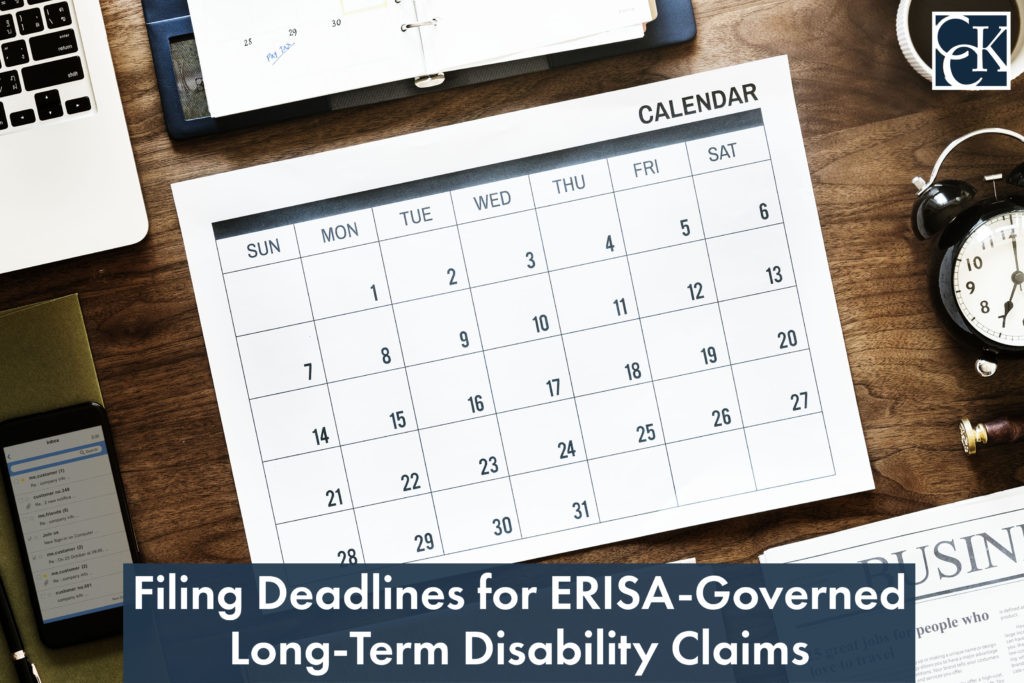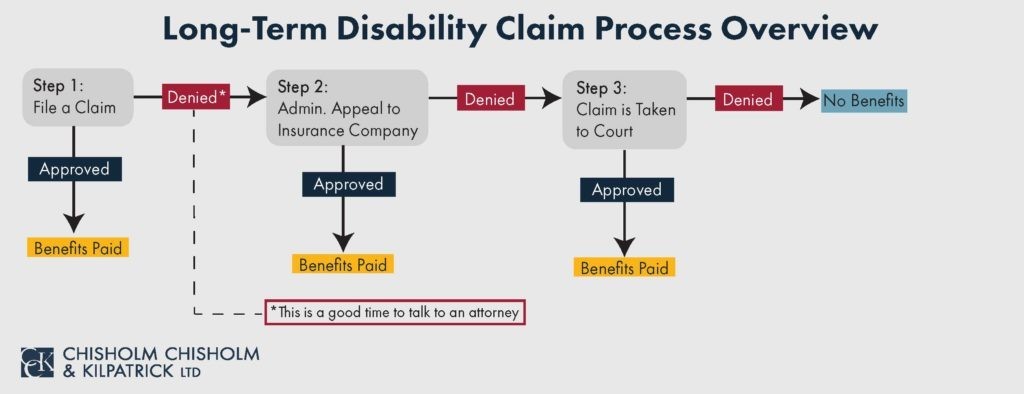Filing Deadlines for ERISA-Governed Long-Term Disability (LTD) Claims

Learning to cope with a new sickness or injury can be difficult, stressful, and cause a lot of uncertainty. In addition to managing your health, you must navigate the procedures and deadlines associated with applying for ERISA-governed long-term disability (LTD) benefits. If you received your long-term disability insurance through your employer, the procedures are likely governed by the plan documents and the Employee Retirement Income Security Act of 1974 (ERISA).
Every stage of the long-term disability claim and appeal process has strict deadlines. LTD claimants must meet these deadlines for a fair review of their claim by the insurance company. Moreover, missing a filing deadline could result in a denial of their claim.
In this article, CCK Law will discuss:
- Deadlines for initial long-term disability claims
- Deadlines for LTD administrative appeals
- Deadlines for LTD lawsuits
Deadlines for Filing an ERISA-Governed Disability Claim
When you become disabled and are unable to work, there may be certain deadlines in which you need to notify the insurance company of your disability and file a long-term disability claim. You must request a copy of the plan governing documents associated with your long-term disability coverage from your employer.
Additionally, your employer should also provide you with a copy of the summary plan description (SPD), which will summarize the important provisions of your employer’s long-term disability plan. Under ERISA, there are certain things that must be included in the SPD.

One such requirement is the procedure governing the employee’s claim for benefits, which includes any applicable time limits, as outlined in the U.S. Department of Labor Regulations promulgated pursuant to ERISA, 29 CFR § 2520.102-3(s). However, the SPD is not necessarily a part of the plan itself and thus its terms may not be controlling. It is important to review all of the documents that actually govern the terms of your plan to determine what the ERISA claim deadlines are, what procedures you need to follow, and what your rights are with respect to your long-term disability claim.
Claim deadlines can vary, so it is important that you review each of the plan governing documents carefully. For example, the plan might specify that notice of claim needs to be submitted within 30 days after your disability begins or, alternatively, it might state that you have over 180 days to provide notice of claim. It is important that you are aware of and able to meet these deadlines because, if you do not, you could lose out on the rights to your long-term disability benefits.
The attorneys and professionals at CCK have experience with reviewing plan governing documents and SPDs and can help you identify any important deadlines. We can take the burden of filing a long-term disability claim off your shoulders.
ERISA-Governed Long-Term Disability Appeal Deadlines
Unfortunately, even with an attorney’s assistance when filing your claim, wrongful denials by the insurance company are all too common. When you receive an adverse benefit determination from the insurance company, either denying your initial claim or terminating your long-term disability benefits, the letter should outline your appeal rights, including the deadline by which you need to submit an appeal for it to be considered.

Under ERISA, you must be allowed up to 180 days following the receipt of an adverse benefit determination on your long-term disability claim to appeal that decision. See U.S. Department of Labor Regulations promulgated pursuant to ERISA, 29 CFR § 2560.503-1(h)(3)(i); 29 CFR § 2560.503-1(h)(4). However, it is important that you review your plan governing documents to determine the specific deadline that governs your LTD claim. If you miss the applicable appeal deadline, you could lose all rights to your long-term disability benefits and be unable to pursue your claim further.
During the 180-day appeal period, the attorneys and professionals at CCK will gather evidence in support of your claim and submit it to the insurance company. This is particularly important in ERISA-governed claims because the appeal is usually the last opportunity you have to get evidence into the record before heading to court.
We will work with you and your family, your doctors, and outside experts to build your case to fight the insurance company’s wrongful denial and work to get you the long-term disability benefits to which you are entitled.
Court Deadlines for ERISA Long-Term Disability Claims
Unfortunately, in some cases, the insurance company upholds its original adverse benefit determination and denies your appeal. There are occasions on which an insurance company may offer a voluntary second-level appeal; however, if it is not written in the plan governing documents, it is not safe to assume this will be offered to you.

Accordingly, the next option that is typically available to you after a long-term disability appeal denial is to file a civil lawsuit against the insurance company in court. Under ERISA, you are entitled to bring a civil action against an insurance company to recover benefits due to you under the terms of your long-term disability plan. See ERISA, 29 U.S.C. § 1132(a)(1)(B).
Similar to the ERISA appeal process, there are usually deadlines to file lawsuits known as the contractual limitation period. After your final appeal is denied, you typically need to file a lawsuit before the contractual limitation period runs, or you will lose your right to your benefits.
Under ERISA, for claims filed after April 1, 2018, when an insurance company issues an appeal denial letter, it needs to include the calendar date on which the contractual limitation period expires on a claim. See U.S. Department of Labor Regulations promulgated pursuant to ERISA, 29 CFR § 2560.503-1(j)(4)(ii); 29 CFR § 2560.503-1(p)(3).
In some instances, there is no contractual limitation period in the plan governing documents, meaning the deadline to file a lawsuit against the insurance company is likely governed by a state law statute of limitations, which vary state by state. Like the contractual limitation period, you must meet any applicable statute of limitations, or you may lose your rights to your benefits.
It is important to review all the plan governing documents carefully and make sure you meet any deadlines that are listed in the plan. If your long-term disability appeal has been denied and you need to file a lawsuit, you should consult with an attorney.
Call CCK Law
Understanding long-term disability filing deadlines is important when trying to obtain disability benefits. Yet insurance companies are often challenging to work with and may try and delay the claim. Whether you need help proving you meet your insurance policy’s definition of disability or appealing a denial of your claim, CCK Law may be able to help. Since 1999, we’ve been helping claimants get the benefits they need. Call us today at (800) 544-9144 for a free case evaluation with a member of our team.
About the Author
Share this Post

